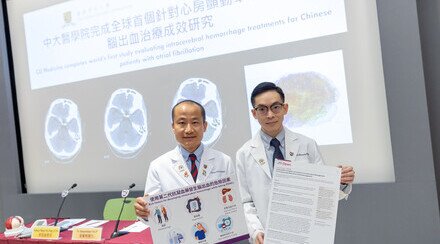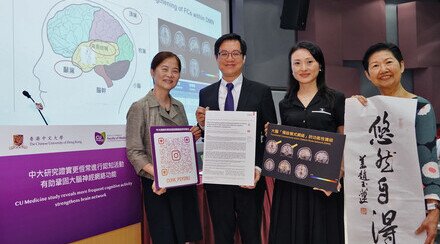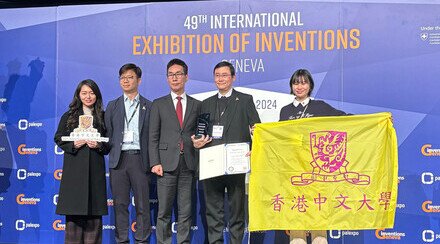CUHK World First Shows AI-derived MRI Brain Indices Aid Clinical Detection of Three Cognitive Disorders at Early Stage

A series of researches recently done by CU Medicine has validated the use of AI-derived MRI brain indices for the detection of early-stage cognitive disorders, including Alzheimer’s disease (AD), Lewy Bodies and frontotemporal dementia. (From left) Professor Winnie C.W. CHU, Director of the Gerald Choa Neuroscience Centre MRI Core Facility and Professor of the Department of Imaging and Interventional Radiology; Professor Vincent C.T. MOK, Director of the Therese Pei Fong Chow Research Centre for Prevention of Dementia and Head (Academic Affairs) of the Division of Neurology, Department of Medicine and Therapeutics; and Dr. Lisa W.C. AU, Clinical Professional Consultant of Division of Neurology, Department of Medicine and Therapeutics, CU Medicine.
To differentiate early Alzheimer’s disease (AD) from normal ageing and to differentiate AD from other common neurodegenerative cognitive disorders such as dementia with Lewy Bodies (DLB), and frontotemporal dementia (FTD) at early stage is challenging. Clinical features of these disorders frequently overlap especially at the early stage of the disease.
A series of researches recently done by the Faculty of Medicine at The Chinese University of Hong Kong (CU Medicine) has validated the use of artificial intelligence derived (AI-derived) MRI indices for the detection of early-stage cognitive disorders, including AD, DLB and FTD. The research team is the first in the world to prove such indices can achieve high accuracy for the detection of these three types of early-stage neurodegenerative cognitive disorders in clinical setting.
Early detection is the key to effective treatment for dementia
Dementia affects one in every ten older adults in Hong Kong and is a major threat to the quality of life of patients and their families. With the rapidly ageing population in Hong Kong, the number of older people suffering from dementia is estimated to rise dramatically from about 100,000 in 2009 to over 330,000 in 2039. Early detection and intervention provide the greatest opportunity to reduce the disease burden. Yet to date, a simple and effective biomarker that aids early detection is still lacking.
Pathological brain changes of common neurodegenerative cognitive disorders often include accumulation of certain abnormal proteins (e.g. amyloid plaques) or loss of certain neurotransmitters (e.g. dopamine). Although current positron emission tomography (PET) or cerebral spinal fluid (CSF) examinations are able to detect these biological changes, these tests are still not widely accessible.


AI-derived MRI biomarkers can detect early AD and other common neurodegenerative cognitive disorders
With the development of AI that can enable “pattern recognition” and MRI automatic computerised volumetric method that can quantify subtle changes in volume of multiple brain regions, the Division of Neurology and the Department of Imaging and Interventional Radiology at CU Medicine utilised technologies which incorporate AI and MRI automatic post-processing methods to investigate the ability of AI-derived MRI biomarkers in detecting early AD and other common neurodegenerative cognitive disorders.
Since 2019, the teams investigated a total of 2,121 MRIs of older adults, with 635 AD patients, 61 DLB patients, 97 FTD patients, and 1,328 elderlies with normal cognition. The studies showed that certain AI-derived MRI Indices could increase the sensitivity in the detection of mild AD by 25% compared to visual inspection.
| Sensitivity | Specificity |
|---|---|---|
Visual Inspection of mild AD | 67% | 81% |
AI-derived MRI Index for the detection of mild AD | 92% | 81% |
The AI-derived MRI Indices could also achieve a good performance in detecting FTD of mild to moderate stage (96%) and in the detection of mild DLB (83%). Subjects who were tested positive could then receive further investigations via PET or CSF to confirm the diagnosis.
| Sensitivity | Specificity |
|---|---|---|
AI-derived MRI Index for the detection of FTD (mild to moderate stage) | 96% | 70% |
AI-derived MRI Index for the detection of mild DLB | 83% | 86% |
The required MRI scanning time can be as short as 15 minutes and the AI-derived MRI indices can be generated automatically in 10 minutes once the images are uploaded to the software, which can be operated via a cloud platform. In addition, other volumetric information of separate brain regions as well as the volume of cerebral small vessel disease-related brain lesion (e.g. white matter lesion) can also be generated, which provides additional information with respect to other brain changes that could impair cognition.










































